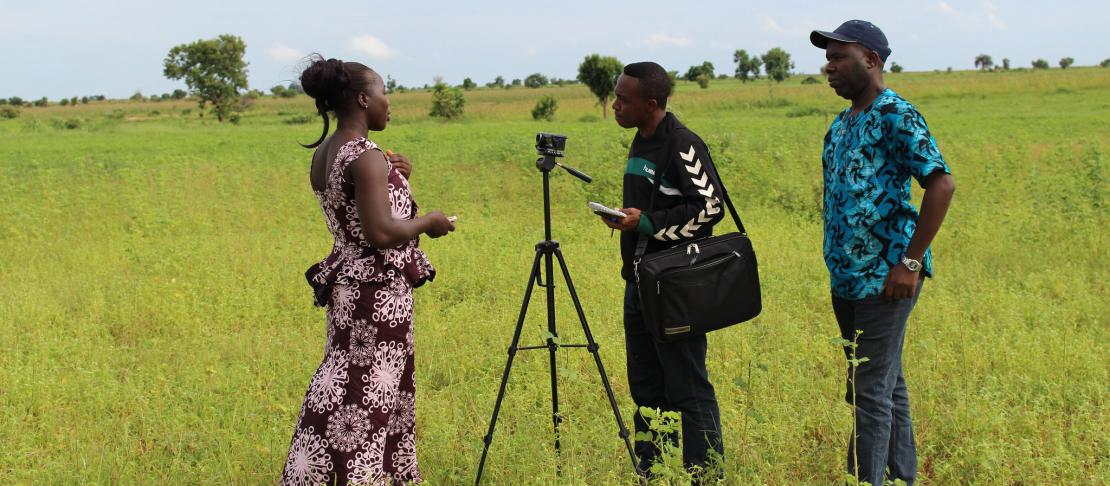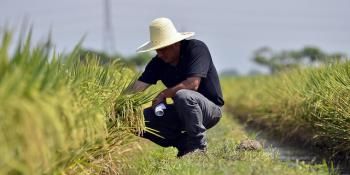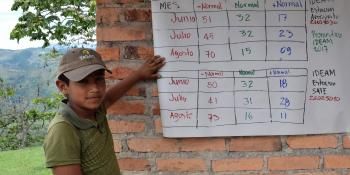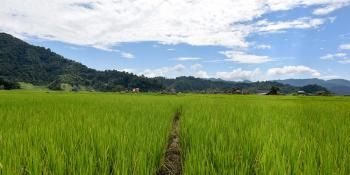Reporting on climate change: developing capacity in Senegal’s media

The media can be an instrument for participatory social change
“You cannot change attitudes and behaviors and awaken the consciousness of people without a touch of information and communication,” writes Senegalese journalist Babacar Sene in a recent article. Babacar, who writes for Senegal’s Journal Agropasteur, was one of a dozen journalists who joined a recent workshop in Dakar, Senegal, which aimed to inform journalists in Senegal about the challenges facing agriculture under climate change, and help them report on the problems as well as the many solutions that are in place.
The workshop, which was organized by the West Africa program of the CGIAR Research Program on Climate Change, Agriculture and Food Security (CCAFS), included journalists from international, regional and local media; national experts from the National Agency of Civil Aviation and Meteorology (ANACIM); researchers from Senegalese Institute of Agricultural Research (ISRA); technicians of the Ministry of Agriculture and Rural Equipment; and L’Union des Radios Associatives et Communautaires (URAC), a local union of community radio stations focused on promoting economic development. Discussions focused on the impact of climate change on Senegal and how the country is adapting.
Only with the help of the press can the issue of climate change become more visible and accessible
Participants agreed that journalists play a vital role. According to Babacar, “journalists can help build consensus, and inform relevant decisions and actions conducive to changing attitudes, behavior and awakening of conscience. You cannot change attitudes and behaviors and awaken the consciousness of people without a touch of information and communication. Only with the help of the press can the issue of climate change become more visible and accessible, and become a central preoccupation. Hence, the need to question the effectiveness of actions to promote the fight against climate change.”
One of the goals of this workshop was to help equip the journalists to link local initiatives with global politics. The upcoming United Nations Climate Conference (COP21) in Paris will put climate change at the top of the media agenda, and will be a good opportunity for journalists to highlight the work on climate-smart agriculture in Senegal as well as in Africa.
“Journalists can take ownership of these national initiatives and ensure wide dissemination of climate information,” he writes. “For that, it is urgent to make scientific and technical information that is generated from Climate-Smart Villages and is accessible and easy to convey, so that it can travel far and inform both political decision-makers and also final beneficiaries.”
Babacar describes discussions on the use of science in reporting on climate change led by experienced science journalists, who focused their interventions on best practices and pitfalls to be avoided in reporting on climate change. Through exchanges with the international journalists who attended, Babacar learned that climate change journalism faces some universal challenges:
During the workshop, international journalists interacted with national journalists in Senegal and in Africa, exchanging views around issues of climate information and its utility in Senegal. This produced a common understanding of the importance given to the fight against climate change and adaptive and mitigation measures implemented.
"The discussions demonstrate that journalists must orient themselves more towards an information and communication offensive for the promotion of the fight against the adverse effects of climate change in Africa. African journalists can also learn from our European colleagues about how to participate effectively in international conferences like COP21 looming in December, and play their full part to deepen coverage of the negotiations.”
Babacar remarked on the many African solutions that were presented, and later visited as part of a field trip to Kaffrine and Niakhar, including Climate-Smart Villages, where innovative work is being done by ISRA, ANACIM, MAER and the CCAFS program, in close collaboration with farmers.
He writes: “Such solutions should be brought to the attention of the international community. Developing the media is extremely necessary, so that they can take ownership of the concepts as well as all the products and solutions that emerge. We need to pool our resources and coordinate, to bring together solid African-based advocacy.”
Babacar shares some positive feedback about the experience: “At the end of the workshop, journalists all testified good understanding of best practices in reporting on climate change and on the ways and means to improve coverage. We now have good information about online scientific resources, the concept of Climate-Smart Villages, and the impact of information services on the regional and global climate locally.”
Watch a video report from the workshop (via Julien Chongwang, SciDev.Net)
Babacar Sene is a journalist with Agropasteur in Senegal. The article was adapted from the original French by Vanessa Meadu, CCAFS Global Communications and Knowledge Manager.



